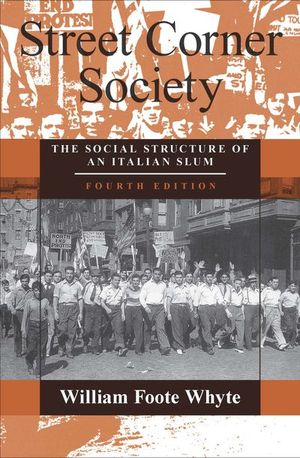Street Corner Society
Published by The University of Chicago Press
The classic study of a poor community in Boston’s North End in the mid-twentieth century.
Street Corner Society is one of a handful of works that can justifiably be called classics of sociological research. William Foote Whyte's account of the Italian American slum he called “Cornerville”—Boston's North End—has been the model for urban ethnography for fifty years.
By mapping the intricate social worlds of street gangs and “corner boys,” Whyte was among the first to demonstrate that a poor community need not be socially disorganized. His writing set a standard for vivid portrayals of real people in real situations. And his frank discussion of his methodology—participant observation—has served as an essential casebook in field research for generations of students and scholars.
This fiftieth anniversary edition includes a new preface and revisions to the methodological appendix. In a new section on the book’s legacy, Whyte responds to challenges to the validity, interpretation, and uses of his data. “The Whyte Impact on the Underdog,” the moving statement by a gang leader who became the author’s first research assistant, is preserved.
“Street Corner Society broke new ground and set a standard for field research in American cities that remains a source of intellectual challenge.”—Robert Washington, Reviews in Anthropology
Street Corner Society is one of a handful of works that can justifiably be called classics of sociological research. William Foote Whyte's account of the Italian American slum he called “Cornerville”—Boston's North End—has been the model for urban ethnography for fifty years.
By mapping the intricate social worlds of street gangs and “corner boys,” Whyte was among the first to demonstrate that a poor community need not be socially disorganized. His writing set a standard for vivid portrayals of real people in real situations. And his frank discussion of his methodology—participant observation—has served as an essential casebook in field research for generations of students and scholars.
This fiftieth anniversary edition includes a new preface and revisions to the methodological appendix. In a new section on the book’s legacy, Whyte responds to challenges to the validity, interpretation, and uses of his data. “The Whyte Impact on the Underdog,” the moving statement by a gang leader who became the author’s first research assistant, is preserved.
“Street Corner Society broke new ground and set a standard for field research in American cities that remains a source of intellectual challenge.”—Robert Washington, Reviews in Anthropology
BUY NOW FROM
COMMUNITY REVIEWS

